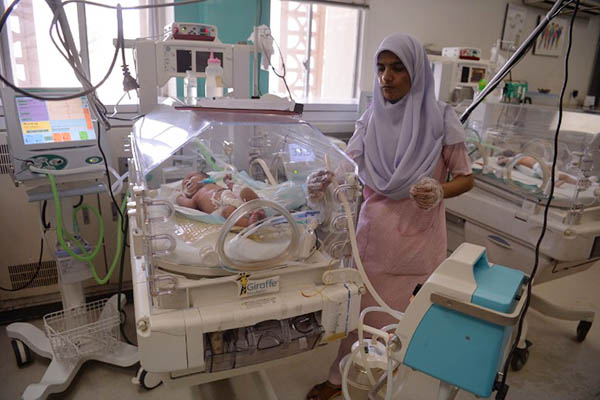
Aamir Qureshi—AFP
UNICEF report has found babies in Pakistan face a one in 22 chance of dying within their first month
In the neonatal intensive care department of an Islamabad hospital, scrawny infants struggle for survival—victims of a vacuum in resources and education in the country with the highest newborn mortality rate in the world.
“In Pakistan, a baby dies every second minute,” says Haider Shirazi, head of the neonatal department at the Pakistan Institute of Medical Science (PIMS), the largest health facility in the capital.
Newborns in the Muslim giant, with its rapidly growing population of 207 million inhabitants, face a one in 22 chance of dying in their first month, a UNICEF report released on Tuesday showed. That makes it worse than neighboring war-torn Afghanistan, as well as the Central African Republic and eight other sub-Saharan African countries, which are often unstable and struggle with desperate poverty.
At the other end of the scale, Japan, which has spent decades guaranteeing the conditions necessary to protect the lives of babies, only lost one infant out of 1,111, according to the UNICEF report.
The ranking is embarrassing for Pakistan. The country is proud of its economic growth rate and expanding middle class, but in the last 10 years has spent just 0.5-0.8 percent of its GDP on healthcare. “It’s only a tenth of what WHO [World Health Organization] requires,” says Kennedy Ongwae, a Kenyan doctor working for UNICEF in Islamabad.
At PIMS, says Dr. Shirazi, there are 15 ventilators for newborns—but PIMS is not representative of hospitals in Pakistan. “In a lot of other parts of the country, they don’t [have such equipment]. And when the babies are infected, they die…The health budget is so pathetically low that we can do nothing with it.”
Inadequate funding is just one of the challenges. Pakistan also struggles with a lack of sex education, family planning, health education for mothers, and healthcare training.
As a result it has the highest birth rate in South Asia—around three children per woman, according to the World Bank. But malnutrition and ignorance coupled with little in the way of birth spacing, or allowing a woman’s body to rest for at least 18 months between pregnancies, make many of the babies particularly fragile, says Dr. Shireen Gul, head of the intensive care unit at PIMS.
“This baby weighs 1.1 kilograms, [this one] 1.4 kilograms, and 1.2 kilograms,” she recites, indicating three tiny bodies, her voice almost drowned out by the beeps of incubators.
In the developed world, she says, neonatal units have one nurse to one or two babies. In Pakistan, it is one nurse to eight infants. “Many babies here do not survive,” sighs Aysha Siddiqa, a nurse, gently rubbing an inert infant.
Dr. Ongwae of UNICEF also points to inadequate training of what staff there are.
Pakistan saw a surge in mothers giving birth in medical facilities between 2001 and 2013, from 21 percent to 48 percent—but neonatal deaths have not decreased as a result, he said. That can be down to issues as basic as midwives who carry out several deliveries without washing their hands.
It is unthinkable behavior in Japan, which “has spent several decades to ensure the ‘conditions necessary to protect lives of babies’,” says Fumio Bessho, a professor of pediatrics and public health, in comments published on UNICEF’s Japan website.
The success is due to medical technology, regional reforms, and “above all, to the presence of many medical workers who take great care of high-risk pregnancies and babies with various problems every day,” he writes.
“[E]asy access to doctors and hospitals for everyone, including frequent health checks during pregnancy, contribute to a good result,” agrees Yasuhide Nakamura, professor of global health at Konan Women’s University in Kobe.
Nakamura also said education of new mothers played an important role. “The existence of the ‘mother and child health handbook’ that almost all mothers in Japan receive when they get pregnant is worthy of special mention,” he said. “As mothers read what doctors write in their handbook, their awareness towards health of their babies and themselves is probably greater” than those in other countries, Nakamura said.
At the local level “mother classes” are offered to women, and nurses come to their homes free of charge, adds Hideki Kiyoshima, professor of modern society studies at Kinki University.
The level of care makes for a jarring comparison with the chaos of Pakistan. “Everything is very simple. We know what we must do and it’s not expensive,” says Dr. Shirazi. But the newborn mortality rate, he says, “was never a priority.”
